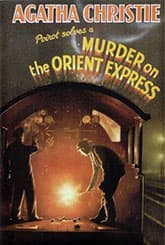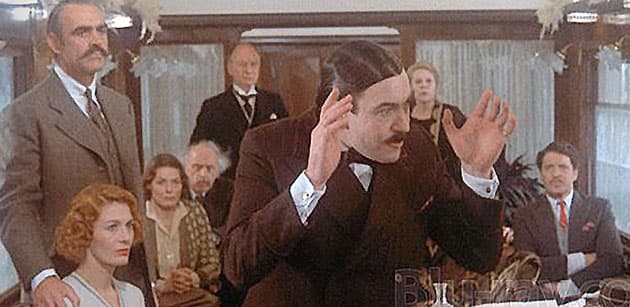Murder on the Orient Express
Critique • Quotes • At the movies
 First edition
First editionAlso known as
Murder in the Calais Coach
First publication
1934
Literature form
Novel
Genres
Crime, mystery
Writing language
English
Author's country
England
Length
Approx. 66,000 words

Albert Finney as Hercule Poirot leads a star cast of suspects in the glamorous 1974 movie adaptation.
Getting murder on track
Murder on the Orient Express (1974): Film, 128 minutes; director Sidney Lumet; writer Paul Dehn; featuring Albert Finney, Richard Widmark, Lauren Bacall, Sean Connery, Vanessa Redgrave, Ingrid Bergman, John Gielgud, Michael York, Jacqueline Bisset, Anthony Perkins, Wendy Hiller
The first film production of Murder on the Orient Express did not appear until forty years after the novel, partly because author Agatha Christie had not been keen on what the movies had previously done with her works. And after the success of that one, we saw no more adaptations for nearly as long again.
But recently we've been receiving new attempts in various media and languages every few years.
Which is odd, because the conclusion of the story, the resolution of the mystery, is such that after getting it once, viewers would be loath to go through the whole charade again, you'd think.
But for the most part the films and TV productions have not disappointed, even if the plot has worn threadbare. The productions have revelled in parading a large group of entertaining actors before the cameras. Some treatments have even improved on the book in certain aspects. We'll look at three of the best.
Hercule to the rescue
The word everyone uses in reference to the 1974 take on Murder on the Orient Express is "glamour". Although the film was made in 1974, in the era of the "new cinema," it harks back in style and setting to the period after the novel came out.
The international cast largely consists of stars from the 1930s and 1940s—legendary movie names like Ingrid Bergman, Lauren Bacall and Richard Widmark, and great stage presences like John Gielgud and Wendy Hiller. They're joined by prominent younger actors like Michael York, Sean Connery, Anthony Perkins, Vanessa Redgrave and Jacqueline Bisset who seem to have been chosen for their ability to fit in with the old-school movie charms of their elder peers.
They all pull it off as passengers on the famous old train where the murder occurs. Bergman in particular was rightly acclaimed for her tour-de-force performance in the possibly least glamorous supporting role in the film.
Sidney Lumet, a modern-day director usually known for his gritty realism (think Serpico and Dog Day Afternoon), throws a soft focus wash over the proceeedings. The very atmosphere seems misty, perhaps to better hide the creakiness of the story and the aging actors. Saturated lighting makes every scene, except those to do with the actual murder, seem over-bright, as in a comedy without the jokes.
And that sprightly soundtrack. At a time when films were being inundated with new sounds and rock music, Murder on the Orient Express is a throwback in this aspect again, skipping along to a lightly orchestral score (nominated for an Academy Award and winning a BAFTA).
Seems unlikely, but it works. It's enjoyable to watch these great old and younger actors going through their paces, working though an acclaimed, solid mystery with a sure-footed director.
Part of Ingrid Bergman's Oscar-winning performance in Murder on the Orient Express.
Except for the lead. I know Albert Finney was nominated for the big awards for his role as Hercule Poirot, who's in almost every scene. But for Christie readers, he's an annoying figure.
Of course, the little, egg-shaped, Belgian detective is supposed to be annoying in his vain, over-polite way. But Finney is neither small nor ovular, but big and blustery as Poirot. His manner exudes no subtle intelligence, only bullish stubborness and a perpetual hunger for vast quantities of food. And he seems to have a permanent crick in his flabby neck as his head is always pulled down and cocked to one side—possibly to make himself appear smaller?
Maybe I've been spoiled by the fastidiously recreated little man by David Suchet in the long-running British series and in the next adaptation of Murder on the Orient Express. Finney does a tremendous job acting in nearly every scene in the movie and especially in his long, long speech at the end outlining his solution to the murder. But for me he is just not playing Poirot.
We never really get inside Poirot's head to understand what drives him in this film. (I'm not sure we ever do in the novel either, to be fair.) So the motivations for his eccentric behaviour must seem perplexing to those who don't know the character.
When Poirot makes his big decision about what to report to the police, it seems in this movie to be not so much a moral decision or a choice for justice, but rather a favour to his friend, a director of the railway line that might be embarrassed by the scandal of murder.
At the end of the film, after Poirot has delivered his solution and leaves the railway car—at the point where the book ends rather abruptly—a new scene is added. All the passengers who had been nervous suspects in Poirot's presence, now left together on their own, file past the camera in close-up toasts to each other, clinking glasses, smiling and kissing. It's a delightful touch, showing the characters in a new light, as "real" people who existed before and after the drama, not just playing pieces to be moved around the board by the great puzzle solver.
— Eric

